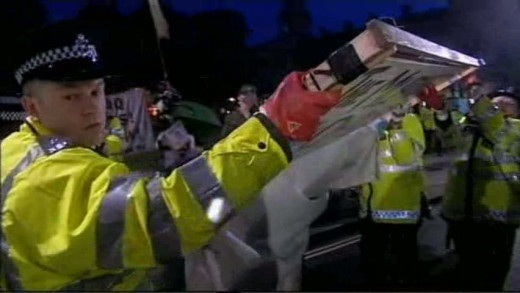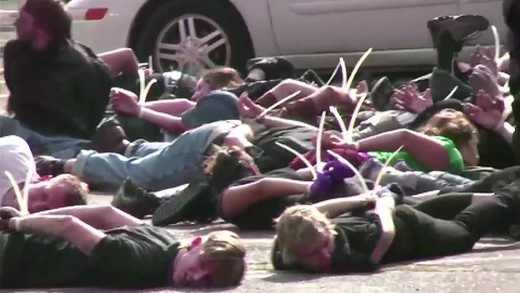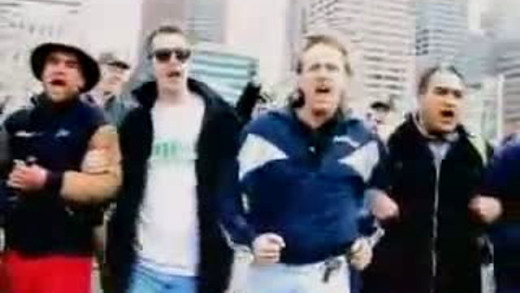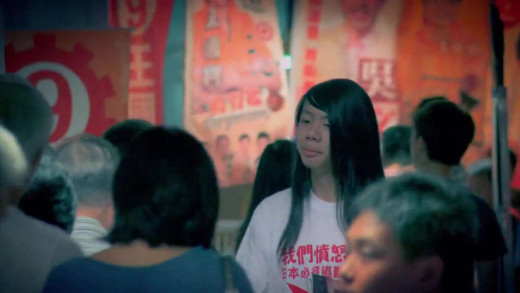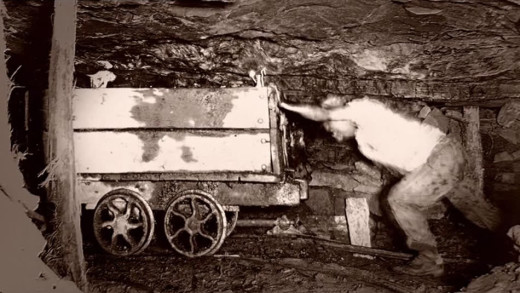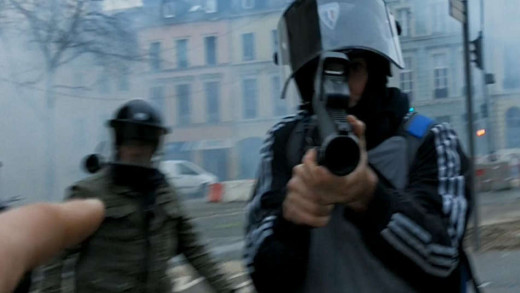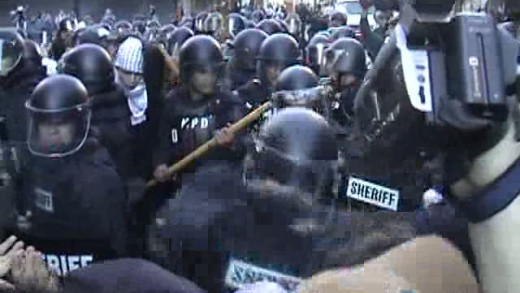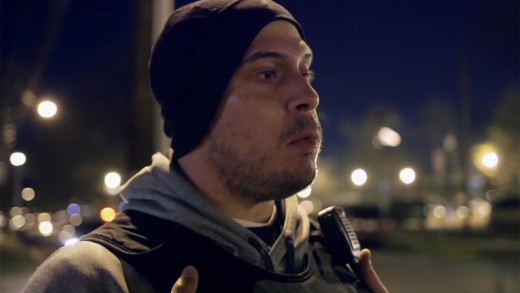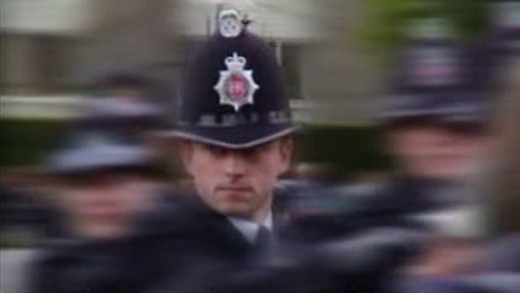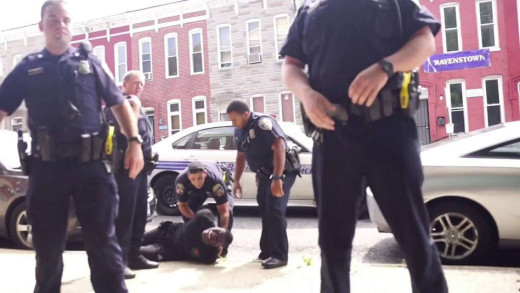This documentary looks at the erosion of civil liberties and increase in government surveillance since 1997 in the UK with the advent of "New Labour" and Tony Blair. Modern politicians, regardless of left or right, always seem to promise hope and change, but what is delivered is more of the same. To illustrate this, the film tracks 6 key areas that have been rapidly dismantled in so-called democracies over the last few decades: Freedom of speech; the right to assemble and protest; the presumption of innocence; the right to privacy; detention without charge, the prohibition on torture...
The legacy of the Bush administration and the so-called "War on Terror" includes a new logic that stretches well beyond the realm of overzealous security agencies, airport security and international relations, and into suppressing public protest; expanded surveillance aimed at entire populations, but especially activists; and mobilising fear for social control. Special police techniques have even been developed and applied in order to specifically suppress dissent and manage protests, especially in the wake of the rising anti-globalisation movements towards the turn of the millennium. Preempting Dissent provides a quick overview of how some of this logic developed, as well as a glimpse of how political protest in the West has been shaped and controlled in the "post-9/11" years, up to and including the so-called Occupy movement. By provoking a reflection of the implications of the logic of the "War on Terror" and how its applied to stifle political protest, Preempting Dissent aims to lay some of the groundwork to develop more effective resistance tactics.
S11
S11 documents protest actions in Melbourne, Australia, 2000 against the World Economic Forum meeting. Specific accounts of police brutality and ferocious attacks on people protesting national and international issues are captured, in direct contradiction with mainstream media coverage, portraying activists as violent protesters.
Filmed over 18 months, Lessons in Dissent is a kaleidoscopic portrait of a new generation of Hong Kong democracy activists. 18-year-old Joshua Wong dedicates himself to stopping the introduction of National Education. His campaign begins to snowball when an interview goes viral on social media. With the new school year fast approaching, a showdown with the government seems inevitable. So with a microphone in hand, and still in his school uniform, he takes to the streets to protest, along with 120,000 people in support. Meanwhile, former classmate Ma Jai fights against political oppression on the streets and in the courts. Having dropped out of school and dedicated himself to the movement, he endures the persecution suffered by those not lucky enough to be protected by the glare of the media. Lessons in Dissent catapults the viewer on to the streets of Hong Kong, confronting the viewer with the country's rising energy of dissent.
In 1929, in the face of collapsing demand for coal and a deepening economic crisis, mine owners in the Hunter Valley of New South Wales, Australia; announced, with the support of government, that they would cut miners' wages and strip them of their workers rights. When the workers refused to agree to these terms the mine owners locked the gates. 10,000 miners, pit boys and their families now found themselves without a job. What began as an dispute about industrial labour ended up overpowering a government, crippling an industry and besieging a community. This event challenged the rights of every Australian worker, and redefined the political and industrial landscape of a country that witnessed an event forever remembered as 'The Great Australian Lockout.'
The Monopoly of Violence is a study of police brutality in France, specifically documenting the gilet jaunes protest movement of 2018 and 2019. But the footage could just as easily have been from the United States, or Hong Kong, or Britain. Citing the work of sociologist Max Weber as a starting point, which shows that the state has the monopoly on the legitimate use of physical force, the film expands into the space of questioning a form of policing that descends into systematic brutality and violence. Using footage from demonstrators and independent journalists to ground the analysis, the images are discussed between lawyers, representatives of social movements, academics, police officers, and victims of police aggression. The result is a clarion call for the rights of the citizen, and the accountability and responsibility of the State.
The Miami Model
The Miami model was the name given to a set of tactics employed by police during protests in Miami, Florida relating to the Free Trade Area of the Americas (FTAA) trade agreement meetings in November 2003. State Attorney Kathy Fernandez Rundle responded to allegations of police brutality by saying, "The police were very professional, very controlled... I think we have a model here for the rest of the world to emulate in the future when these sort of events take place." This film documents these tactics from the perspective of the protesters, to show what really happened to them and to document their work opposing the FTAA, countering the mainstream media narratives of the event and the tropes espoused by those in power.
Over the past several years, a seemingly relentless string of killings by police of unarmed black men—Michael Brown in Ferguson, Freddie Gray in Baltimore, Eric Garner in New York—has reignited issues around race, policing and civil rights in the United States that have been languishing unresolved for decades. Recently the issues are critical enough that the Department of Justice has stepped in to mandate reform of several police forces renowned for brutality and institutional abuses of power. In Policing the Police, journalist Jelani Cobb gets up close and personal with police departments and officers alike, to show from the inside the difficulties these institutions now face of fixing a broken relationship with the community after decades of mistrust. Is it even possible with the current police culture? Policing the Police is a powerful case study of these questions, and a light on just how much has to change.
The Secret Policeman exposes first hand evidence of racism in the British police forces, revealing how much it has been driven underground since 2002 when a government inquiry branded the police as institutionally racist. Undercover journalist Mark Daly joins the Greater Manchester Police as a trainee, and infiltrates Bruche Police Training Centre in Warrington, Cheshire for several months using hidden cameras to capture direct instances of racism throughout the police force.
Copwatch
Copwatch depicts WeCopWatch, an organisation dedicated to video recording the police in the United States. For example, Cop Watch members capture original video of the deaths of Eric Garner in Staten Island and Freddie Gray in Baltimore. Its members legally record and document police arrests as part of a movement for police accountability and transparency, but often find themselves to be the victims of chaos and police brutality as a result of the culture of extreme police misconduct and violence. The stories are told through Ramsey Orta, Kevin Moore, who filmed the police abuse of Freddie Gray, and David Whitt who lived in the apartment complex where Michael Brown was killed, as well as Jacob Crawford, who co-founded Copwatch groups inspired by the Berkeley Copwatch group. The film shows how Cop Watchers are dedicated to bringing awareness to their community, by exposing police brutality and harassment.
